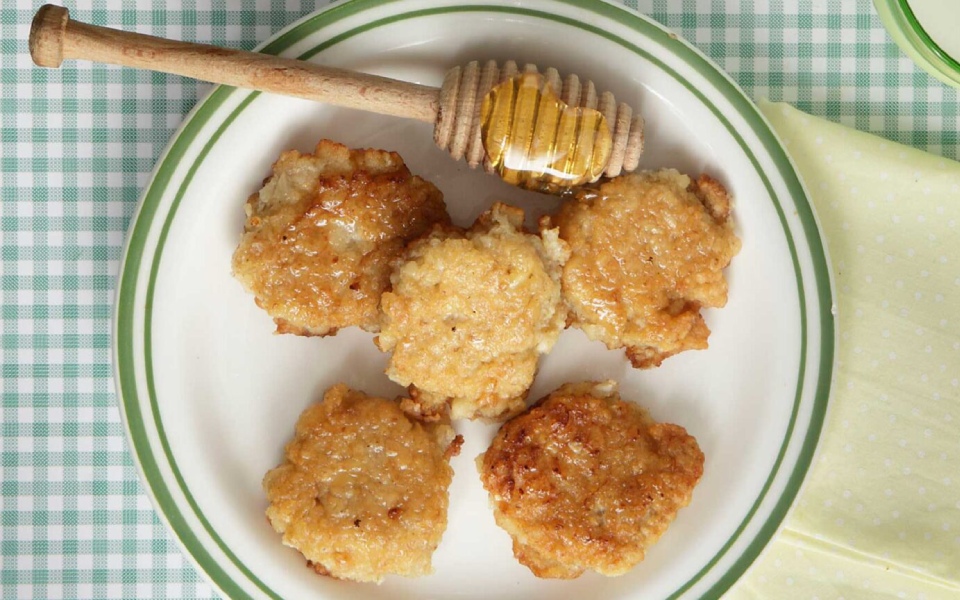Don Dines in Athens: O Skoufias, Pangrati
A hidden gem in Pangrati where...

© George Drakopoulos, Petros Andrianopoulos
Simple in conception and preparation, tiganites, as well as similar creations such as loukoumades and crepes, are nothing more than neutral-tasting doughs made with flour and water. On this base we can make countless creations, adding just a few more ingredients sometimes for volume and other times for aroma, flavor or sweetness.
For loukoumades, deep frying in plenty of oil is required. However, crepes and tiganites only require minimal to no fatty substance, as long as we use a non-stick pan.
A mixture of flour and water forms the base for the easiest fritters, also known as ‘water-fried’ tiganites. They are common in many parts of Greece and abroad. The process is as follows: mix plain flour and water until we create a smooth blend, sometimes like soft dough and other times like semi-liquid batter. A good ratio is 1 cup of flour to 1 cup of room temperature water. We fry them in minimal (or no) oil or butter, until they turn golden brown. No leavening agent (e.g. baking powder) is usually added, which is why they remain relatively flat. Of course, there are exceptions. In Evros, for example, they make ‘puffed’ crepes with yeast, which are soft and full of small holes. Others add a little baking powder to the basic batter.
The batter for simple tiganites is used immediately unless we have added leavening agents, in which case it is good to let it ‘rest’ for 10-15 minutes.
For a richer flavor, we can enhance the simple flour and water mixture as follows:
Add 1-2 eggs to make the tiganites more delicious, with a rich flavorful body.
To make them fluffier while still somewhat flat, add baking powder, baking soda, yeast, or self-raising flour, which can replace all or part of the plain flour in the recipe.
A small amount of ouzo or tsipouro can be added to the mixture, while a portion of the water can be substituted with milk for flavor and volume, as their enzymes react with the leavening agents.
The tiganites batter is neutral in taste. If we don’t alter it by adding characteristic ingredients (such as spices, salt, or sugar), then the result can be served either as a dessert (for instance, drizzled with honey) or as a savory dish (e.g., sprinkled with cheese).
For sweet tiganites, it is common to add a little powdered sugar and aromatics to the mixture, such as vanilla, lemon or orange zest, mastic powder, a hint of cinnamon, etc.
An interesting addition is raisins and dried fruits such as dates, figs, or apricots, finely chopped. The raisins can also be soaked in advance.
If we want to make savory tiganites, we add salt and some cheese to the neutral batter; for example, crumbled feta, anthotyro, or another white cheese. This mixture will be slightly thicker than the plain pancake batter. We can flavor the mixture with dried herbs such as thyme, oregano, marjoram, basil, tarragon, etc., finely chopped. Serve these tiganites with yogurt or another creamy cheese.
Tiganites are etched in our collective memory as a dessert, often drizzled with honey, grape molasses, or syrup from fruit preserves, especially grapes and quince. A bolder and more gourmet combination involves accompanying these ingredients with savory pancakes.
However, the classic serving method calls for just sugar and cinnamon.
More modern variations include serving with maple syrup (a classic example being American pancakes), yogurt, sweet whipped cream, fluffy anthotyro or ricotta cheese, paired with fresh fruits, jams, and toasted nuts (such as pistachios, walnuts or hazelnuts).
This article was first published in Greek in gastronomos.gr.
A hidden gem in Pangrati where...
Experience Pilio’s scenic hikes, aromatic herbs,...
The historic Peloponnesian castle town of...